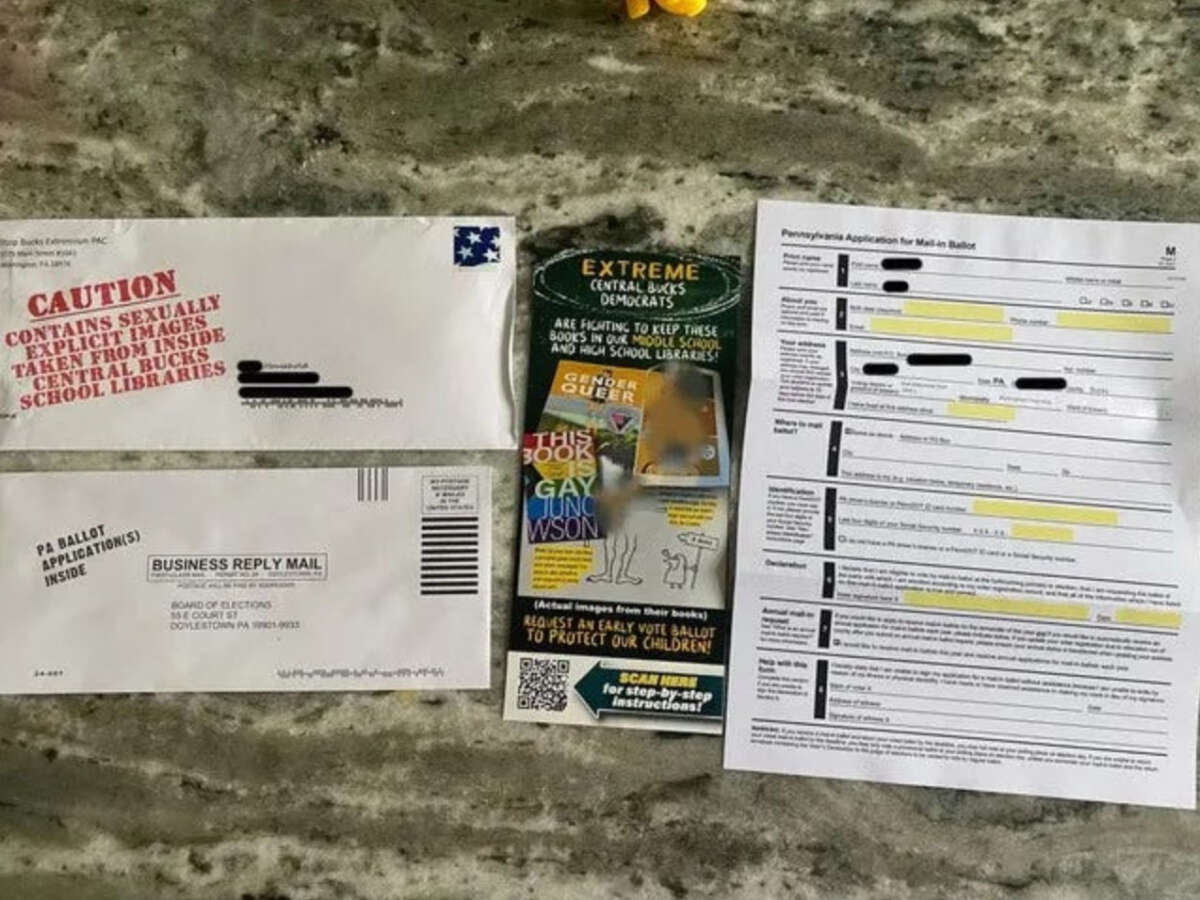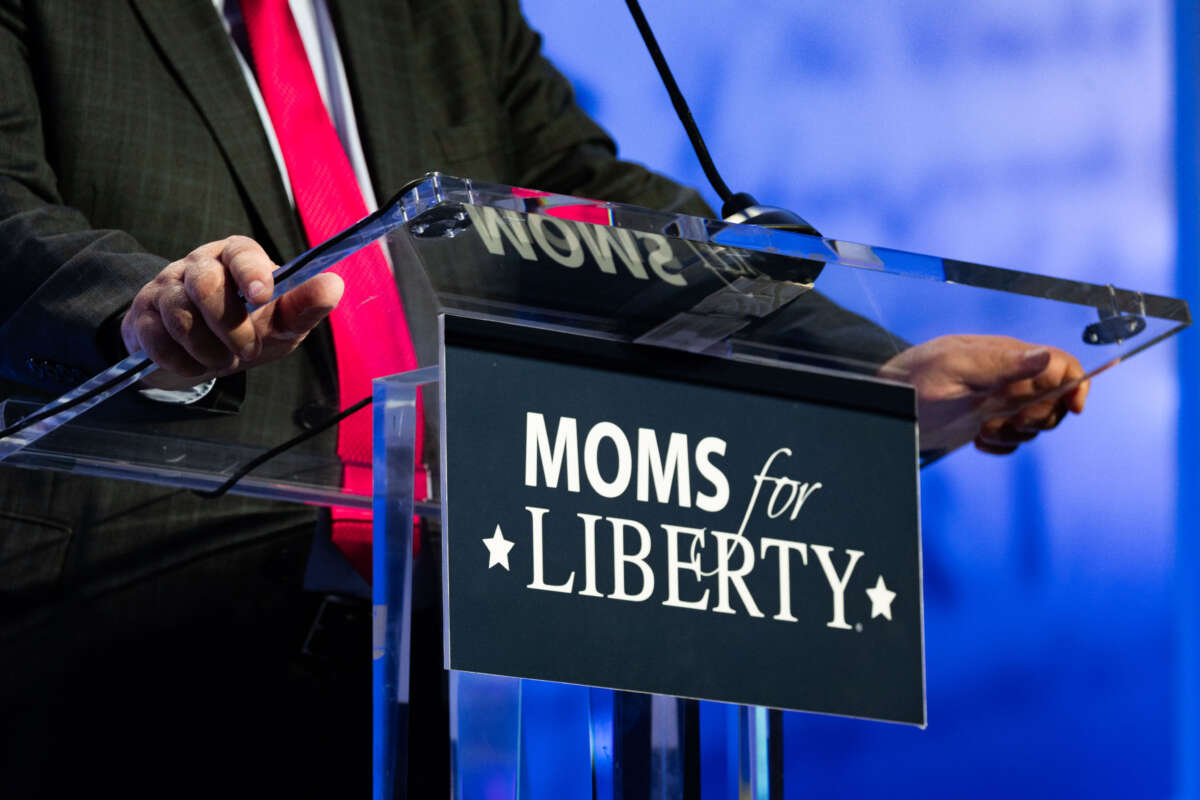Honest, paywall-free news is rare. Please support our boldly independent journalism with a donation of any size.
On Tuesday, election results poured in and within minutes of polls closing, it became apparent that Democrats were going to have a good night. Kentucky’s Governor Andy Beshear surged ahead, despite the over $2 million in anti-trans ads deployed against him. As the evening progressed, Democrats clinched victories in numerous contests, including taking control of the House and Senate in Virginia, securing a pivotal Pennsylvania Supreme Court seat, affirming a constitutional right to abortion in Ohio, and capturing mayoral positions in several municipalities. Another narrative began to emerge, though: the overwhelming defeat of Moms For Liberty and anti-trans school board candidates across the country, including pivotal districts like Bucks County, Pennsylvania, and Loudoun County, Virginia — areas critical to the 2024 election landscape. After championing a significant anti-trans agenda in 2023 and proposing more legislation against the LGBTQ+ community than the past decade, Republicans running on that platform faced unexpected and widespread defeats.
The most intense scrutiny over transgender issues was seen in Kentucky, where Governor Andy Beshear faced a barrage of more than $2 million in anti-trans advertisements from the American Principles Project. These ads included a spot titled “Real Man,” featuring Lia Thomas and anti-trans swimmer Riley Gaines. Other ads insinuated that Beshear would covertly assist children in gender transition and sanction surgeries for trans minors as young as nine, despite no evidence of such procedures being performed on young transgender youth in the state. This followed Governor Beshear’s veto of legislation prohibiting all gender-affirming care for transgender youth, including hormone therapy and puberty blockers, which was overridden by the state’s Republican supermajority. Notably, Beshear secured his position by a substantially larger margin than in 2019. Moreover, in 2019, the very same organization launched a significant anti-trans advertisement against Beshear, which similarly did not tip the scales. It appears that Kentucky’s electorate has grown increasingly opposed to such tactics targeting transgender individuals in the state.
Senator Claire McCaskill spoke on MSNBC’s Morning Joe, pointing out the outright rejection of the tactics in the state. She stated of the race, “This issue about transgender rights, the Republicans think they have this big winner… People voted for [Beshear] last night over the Trump-backed candidate in a big way. So these issues, they think banning all abortions and transgender rights, they think these are winners? They need to check again with the suburbs of America, because they are not winners in the suburbs.”
Governor Beshear’s reelection would be the first sign of what was to become a long night for anti-trans Republicans. In Virginia, where Glen Youngkin heavily pushed a controversial “model school policy ” that mandated discrimination against transgender students, Democrats took both the House and the Senate. Transgender candidate Danica Roem became the state’s first openly transgender senator. These victories occurred despite Governor Youngkin’s team prioritizing policies targeting transgender people in sports in flyers handed out at political rallies for Republicans in the state.
The rejection of measures aimed at transgender students was starkly evident in the defeat of school board candidates endorsed by Moms For Liberty and those who advocated for policies against transgender students. In Virginia, by Wednesday morning, five out of six school board candidates supported by Moms For Liberty were trailing in their races. In Loudoun County, a critical battleground in the debate over transgender policies, Democrats gained a 6-seat majority on the school board. This district had been at the center of national attention, spotlighted by conservative media following a sexual assault incident involving a purportedly transgender student — a claim for which there was no substantiated evidence.
Triumphs for school board candidates advocating for transgender rights extended beyond Loudoun County. In Albemarle County, Justice Scalia’s daughter, Meg Scalia Bryce, was defeated in her bid for the local school district board. Her campaign was marked by opposition to transgender rights and anti-“CRT” rhetoric. Meanwhile, in Fairfax County, where the school board declared its refusal to enforce Governor Youngkin’s policies directed at transgender students, right-leaning candidates in favor of Youngkin’s policies were unsuccessful as Democrats swept every seat. This election was deemed a critical indicator of the “parental rights” movement’s targeting of trans students. In the Livingston school district, the incumbent Kirk Twigg was unseated following his controversial proposal to burn LGBTQ+ books.
The narrative of candidates aligned with Moms For Liberty suffering electoral defeats played out nationwide. In Bucks County, Pennsylvania, an electoral bellwether, Democrats clinched every seat on the Central Bucks School Board election results. This race became one of the costliest in U.S. history for a school board, with campaign spending reaching $600,000. The district was a battleground over book ban and anti-trans policies, with Republicans distributing flyers showcasing explicit images about books featuring trans characters to households throughout the district.

This pattern repeated itself across the nation. In Pennsylvania’s Central York School District, Democrats overturned the previously Republican-held school board amidst controversies over book bans and anti-LGBTQ+ policies that led to packed school board meetings. A similar victory for Democrats unfolded in Perkiomen Valley School Board, which saw national attention over a trans bathroom ban in schools there; Democrats swept this race on Tuesday. Similarly, in Iowa’s Linn-Mar School District, a focal point for national conservative media due to debates over transgender student policies, all three Moms For Liberty-endorsed candidates were defeated. This trend was echoed throughout Iowa, with 12 out of 13 such candidates facing losses. In Kansas, Johnson County voters rejected all candidates from the group in school board elections. And in Minnesota’s Rosemount-Apple Valley-Eagan School District, all four contenders were unsuccessful.
Book bans around LGBTQ+ books were a major losing issue in the 2023 elections. This was most evident in Pella, Iowa, where a ballot initiative would have given county officials the ability to ban books from the library after the library chose to keep “Gender Queer” in stock. The town, which had voted +35 for Donald Trump in the 2020 elections, rejected the ballot initiative.

Several other candidates supporting transgender people won their races. In Pennsylvania, Judge Daniel McCaffery was elected to the state supreme court. He has been a vocal ally of the LGBTQ+ community. In New Jersey, Democrats flipped multiple Republican seats and held onto competitive seats. In one hotly contested race in a competitive district, Democrat Vin Gopal defeated a Republican challenger running on trans people in schools. Similar narratives unfolded in contested races cross the country.
This is not the first time Republicans have lost on trans issues. In 2022, similar results unfolded: In Georgia’s senate race, Herschel Walker’s focus on anti-trans swimmer Riley Gaines did not resonate with voters, as evidenced by Senator Warnock’s win. Similarly, Arizona, Kari Lake’s emphasis on Governor Hobbs’ husband’s counseling of a transgender youth did not sway the election in her favor. Across the country, anti-trans campaigns consistently failed to deliver Republican victories last year, from Michigan’s Democratic sweep to the Wisconsin Supreme Court election and Pennsylvania’s legislative races. These outcomes were so striking that Michigan’s Republican chair attributed their losses across all government branches to prioritizing anti-trans issues over economic concerns. Many were watching to see if, after relentlessly targeting transgender people in 2023, this pattern would change.
Republicans face difficult decisions ahead. With the 2024 legislative session on the horizon, the battle over transgender rights has escalated to a national stage. Presidential hopefuls are pushing for complete prohibitions on gender-affirming care. The newly appointed House Speaker, Representative Mike Johnson, a former spokesperson for the Alliance Defending Freedom, has been criticized for anti-LGBTQ+ sentiments. A looming national budget conflict sees Republicans proposing numerous amendments to ban trans care and directly target transgender individuals, even threatening a government shutdown to push these culture war stipulations. However, if past election outcomes in 2022 and 2023 are a barometer, such strategies could lead to electoral repercussions.
While political analysts have largely centered their post-election discussions on the influence of abortion rights, the significant role of LGBTQ+ rights in the 2023 elections has not received its due attention. Overlooking the sweeping defeats of anti-trans candidates at the local level and the surge of voter turnout driven by student-led organizers would be to overlook a pivotal narrative of the 2023 elections — a narrative that could carry profound implications into 2024. For the students and transgender youth witnessing the downfall of numerous anti-trans and anti-LGBTQ+ figures, the sense of relief is palpable and undeniable.
This piece was republished with permission from Erin In The Morning.
A terrifying moment. We appeal for your support.
In the last weeks, we have witnessed an authoritarian assault on communities in Minnesota and across the nation.
The need for truthful, grassroots reporting is urgent at this cataclysmic historical moment. Yet, Trump-aligned billionaires and other allies have taken over many legacy media outlets — the culmination of a decades-long campaign to place control of the narrative into the hands of the political right.
We refuse to let Trump’s blatant propaganda machine go unchecked. Untethered to corporate ownership or advertisers, Truthout remains fearless in our reporting and our determination to use journalism as a tool for justice.
But we need your help just to fund our basic expenses. Over 80 percent of Truthout’s funding comes from small individual donations from our community of readers, and over a third of our total budget is supported by recurring monthly donors.
Truthout has launched a fundraiser to add 340 new monthly donors in the next 5 days. Whether you can make a small monthly donation or a larger one-time gift, Truthout only works with your support.
